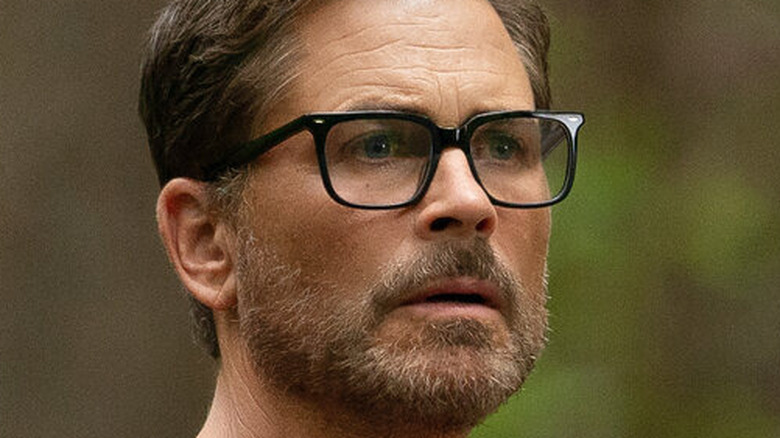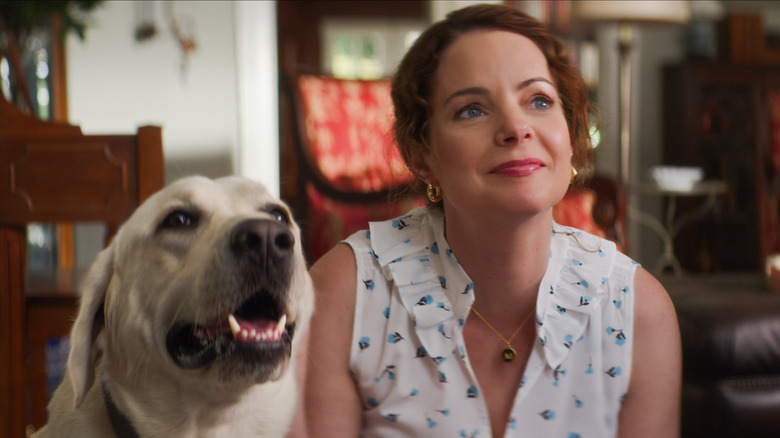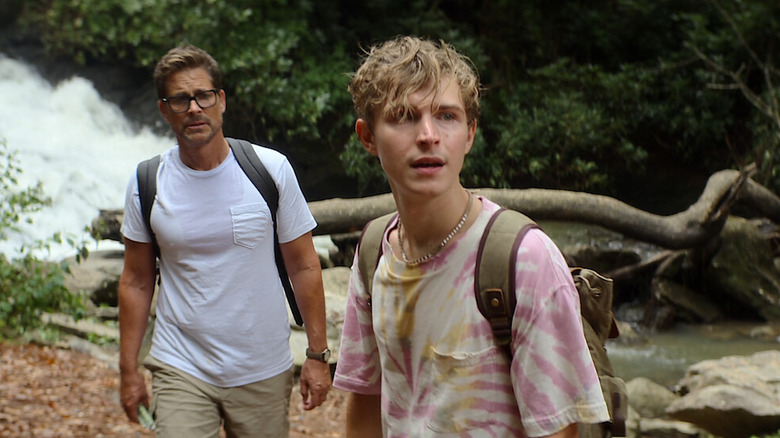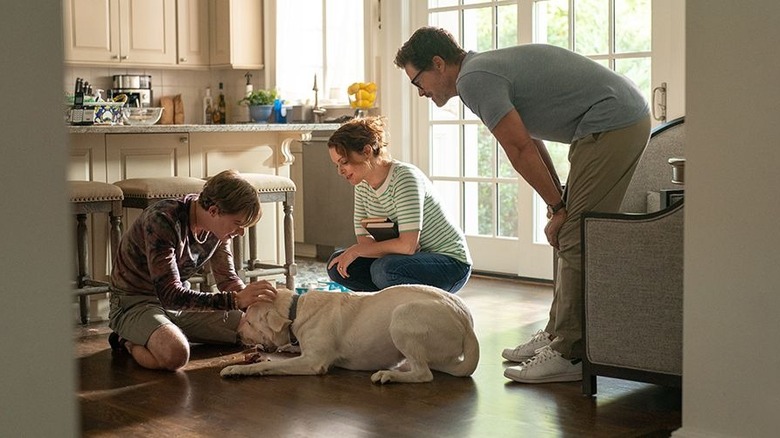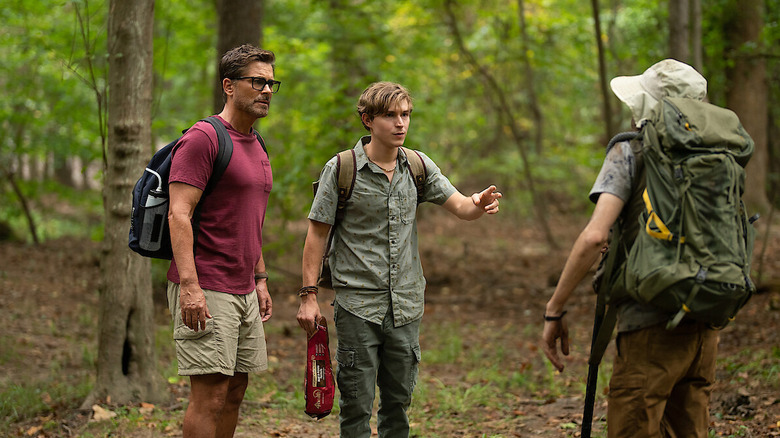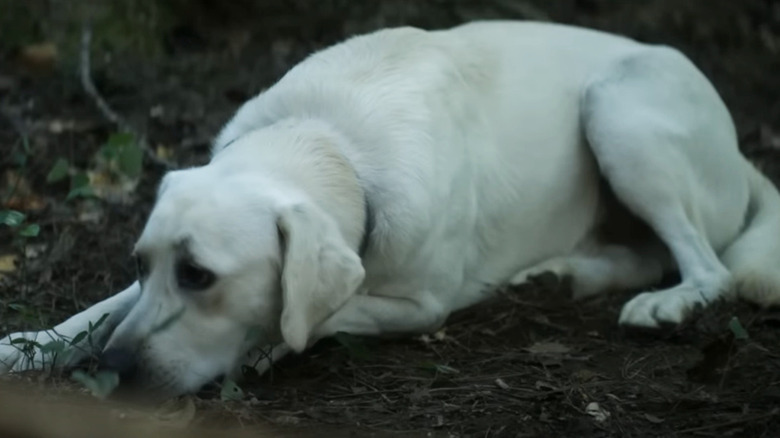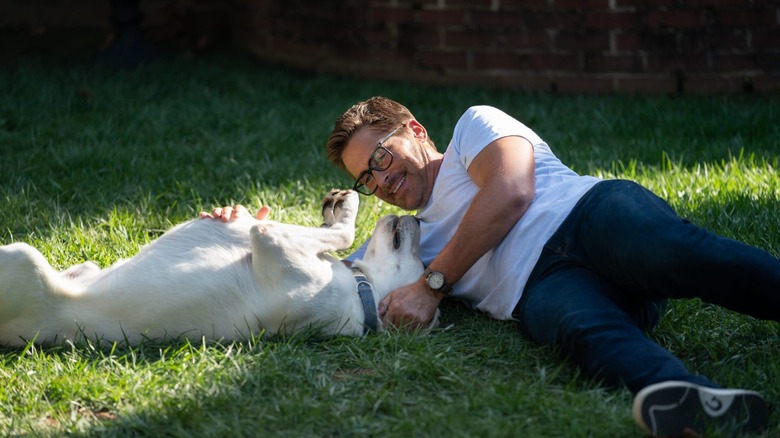The Ending Of Dog Gone Explained
Netflix recently provided dog lovers with "Dog Gone," a new movie that takes them on a heartwarming adventure to find a family's lost dog. The film, based on the real-life story told in Pauls Toutonghi's 2017 book "Dog Gone: A Lost Pet's Extraordinary Journey and the Family Who Brought Him Home," follows the Marshall family as they go on a search for their beloved dog Gonker after he goes missing on the Appalachian Trail. It's a story that'll easily touch the hearts of dog lovers far and wide.
From their encounters with other dog owners who support them in their search to their story reaching places around the globe and inspiring others to help, the Marshalls' love for Gonker is felt throughout "Dog Gone." Also, there's some growth for the Marshalls themselves that comes from gaining a better understanding of each other. The story of "Dog Gone" definitely has some tender threads that aren't too complicated, but the story takes some surprising turns. Thus, it's worth looking into some of the key moments of "Dog Gone" and delve into everything that happens in the conclusion.
Explaining Addison's disease
Although Gonker seems like the most spry and energetic dog you could find at the start of the film, it becomes clear that there's something off about him after Fielding (Johnny Berchtold) brings him home. Gonker's mobility slows way, way down. At first, Fielding just thinks that it's because of all the hiking and activities they do. But it becomes obvious that the problem is connected to Gonker's health, and the Marshalls soon discover that he has Addison's Disease.
Addison's disease is an endocrine disorder that can affect people and animals. It stems from the inadequate production of certain hormones and can lead to dangerously low adrenaline levels. Those afflicted often suffer from fatigue, darkening of the skin, and severe low blood pressure. Without treatment, Addison's disease can be fatal. That's exactly the fear that the Marshalls have for Gonker as he requires a monthly shot to keep his health in check. With him lost in the woods, the Marshalls are in a race against time to find him before he needs his next shot.
A boy and his dog
As we meet Fielding, he's in an emotionally vulnerable state as he's just gone through a breakup and isn't exactly sure what he wants to do after college. Thus, he decides to get a dog and that's when his relationship with Gonker begins. So, after Gonker becomes lost, Fielding is obviously devastated and goes to great lengths to find him. However, his sadness stems from the possibility of losing his dog, as well as other related factors.
With Fielding experiencing some social anxiety issues and not exactly feeling supported by his parents, especially his dad (Rob Lowe), Gonker gives him the unconditional support that he feels he needs. Gonker will do all different kinds of outdoor activities with Fielding and comfort him endlessly when he feels down. With Gonker not around, Fielding is completely out of his routine and can't even sleep without his dog by his side. Gonker is the kind of best friend that Fielding has always wanted. That's why when Gonker goes missing, it really feels like Fielding's heart has been ripped out and he becomes increasingly distraught and distressed with each day that passes.
Former love lost
Fielding's mom Ginny (Kimberly Williams-Paisley) is especially gutted by Gonker going missing and even turns her kitchen into a control room for Gonker's search campaign. Although this sudden emotional reaction might seem strange at first, some flashbacks help us understand why Ginny is so deeply invested in getting Gonker home. When Ginny was a child, she was given a dog named Oji who she loved but her parents didn't care for. They would leave Oji out in the cold if they were throwing a dinner party, and showed no real affection towards him whatsoever.
Sadly, Oji ended up getting run over one day while Ginny was at school and her parents harshly told her just to get over it. With no real closure from the tragedy, Ginny continues to grieve for Oji years later. So, when Gonker suddenly goes missing, Ginny's lingering feelings about Oji's death instantly resurface and become a key driving force for her to do everything in her power to get Gonker's story out there. Ginny's flashbacks and personal narrative surrounding Oji are a surprising story thread in "Dog Gone," but add to the emotion of the film.
A father's greatest worry
From the start of the film, it's clear that Fielding and his dad John have some ongoing issues. John obviously disapproves of how Fielding spends his time and gives him a cold remark when he misses his graduation ceremony. Even when Fielding returns home after college, there's a lingering tension between them, and Fielding also overhears that his father isn't happy that he's still home with no plan for his future.
These feelings of disappointment and concern — a key part of the father-son arc throughout the film — come out while Fielding and John are out looking for Gonker. In a campfire scene with a bunch of other post-grads that are just like Fielding, John opens up more about his feelings towards Fielding. He explains that his concerns are that of every father and that he simply worries that Fielding won't be able to build a strong future for himself, leaving him hopeless. While his concerns are valid and easily relatable, he comes to learn a greater lesson that starts to mend his broken relationship with Fielding.
Dog lovers are all over the place
The Marshalls' love for Gonker is incredibly clear, especially Fielding's, but they aren't the only dog lovers shown in the film. "Dog Gone" includes plenty of people who have had or currently have dogs in their lives. From the editors of local newspapers to leaders of biker clubs, it feels like nearly every character in this movie has had a dog influence their life in some way. So, it's worth noting that this love of dogs is a strong connecting thread throughout "Dog Gone."
Pretty much any time that the Marshalls hand a flyer out to a person or talk to them on the phone, those people relay a story about their own experiences with dogs that motivates them to help or show support. It's a strong demonstration of how impactful dogs can be in someone's life and is a big reason that Gonker's story spreads so far. The Marshalls' love for Gonker is unparalleled given what they're willing to do to go and look for him, but they're not alone in feeling this compelling compassion towards "Man's Best Friend" and it's what makes their story so universal.
(Note: We're not suggesting people can't form special, important relationships with other types of animals; this particular movie just happens to focus on dogs.)
All over the world
With Ginny contacting pretty much anyone who is willing to hear Gonker's story and Fielding and John going town to town, it's not too long until other people join in and help their search. But just how far does Gonker's story reach? Well, its media scope might start small with just a few local papers. However, before the Marshalls know it, they start to become recognized by people while they're searching and even start to receive messages of support from folks around the world.
At one point, Ginny receives a call from a supporter in Africa who instructs her to leave something of Fielding's outside since his scent might draw Gonker home. There's an entire sequence of texts and social media messages from people around the country flooding the screen that further proves how much Gonker's story has touched people. Gonker's story even gets reported by The Associated Press at one point, which undoubtedly helps get it seen by readers around the world. So, although Gonker's disappearance starts as an issue for just the Marshalls, it becomes the concern of supporters from around the globe, and that reach is what makes the story of "Dog Gone" incredibly remarkable.
Not lost, just looking
Although Fielding is kind of a mystery to his parents, he's actually not that different from most post-grads. He's a little lost about who he's going to be for the rest of his life and simply wishes for more time and support in trying to understand himself. It's a key reason that he and John simply don't have a solid bond, but there's a sequence that helps both John and viewers understand Fielding's current state in life. As John and Fielding continue looking for Gonker, they come across a campsite with people the same age as Fielding.
While Fielding is chatting with some of the campers, John talks with a group around a campfire and gains a better understanding of Fielding. While John voices his worries about his son's future, one of the campers tells him to give the situation time and accept that there isn't necessarily an unchangeable timeline to this kind of thing. He even uses hiking as a metaphor and explains that Fielding isn't ready to get off the path of exploring himself yet and needs a little more time. It's a surprisingly thoughtful sequence that really opens you up on the post-grad experience and the shocking feeling of life really starting.
A better bond
As Fielding and John continue their search, their relationship noticeably starts to improve. While John still has his concerns over Fielding's life choices, a part of him begins to connect with his son in a meaningful way. After talking with other people who aren't too different from Fielding, he's able to gain a better understanding of where he's at in life and that he simply needs more time to figure out who he wants to be. From this moment, conversations between Fielding and John start to have a better tone and the father and son see different sides of each other.
Fielding is able to see his dad not only show some social confidence when talking with the biker club, but also some toughness when he stands up for Fielding at a bar when some drunk patrons start looking for a fight. John is also able to see a more comforting side of Fielding in this experience and their love for Gonker is what ultimately sends them on this emotional bonding journey. Although Fielding and his father don't see eye-to-eye at the start of the film, they feel like a real father and son by the end.
Calling it quits
Although the Marshalls are willing to spend weeks endlessly searching for Gonker, there is a breaking point that comes when one of their own looks unwell. With Fielding not eating or sleeping throughout the whole experience, it's not too long until he starts to look incredibly weak. By the end of the search, he has grown immensely pale, skinny, and can barely walk. With John noticing that his son's condition is only getting worse, he makes a tough but necessary decision.
After Fielding spends nearly half a day hiking, John decides it's time for him and Fielding to go home and call off the search. It's obviously the right call since John doesn't want to also lose Fielding while he's searching in the woods, but it's a rough choice since it all but guarantees that Gonker is gone for good. The pain that the Marshalls feel in having to call off the search hits hard and Fielding's reaction definitely shows how hard it is to think that Gonker will no longer be by his side.
Fielding's secret health condition
Fielding's lack of sleeping and eating would seem like a side effect of feeling depressed that Gonker is still missing, but there's actually a scary, legitimately life-threatening reason behind it. It turns out that Fielding has actually been dealing with a stomach issue for quite some time, and has been keeping it a secret from everyone. Any time he tries to eat something or sleep, it causes him pain. He eventually starts coughing up blood — a clear signal that his condition is getting worse.
Eventually, Fielding is forced to go to the hospital where it's discovered that he has ulcerative colitis, which basically means that he has an ulcer in his colon. It's a terribly painful and dangerous condition that can result in death if left untreated for too long. Luckily, Fielding is able to pull through from this condition and starts a slow recovery process at the end of the film. Fielding's health scare definitely adds some sudden terror at the end of "Dog Gone," especially since it comes after such a heartwarming moment.
A delightful reunion
After giving up their search for Gonker and pretty much resigning themselves to the fact that their beloved dog is likely gone, the Marshalls get a phone call about someone possibly spotting Gonker. Apparently, this person saw a dog that looks a lot like Gonker rummaging through their trash. However, upon arriving at the location, the Marshalls discover Gonker seems to be gone and all hope seems lost. It's not too long, though, until Gonker reappears and gleefully runs towards Fielding, creating a harmonious reunion.
Gonker's return home is incredibly blissful, as he makes this family truly feel whole again. However, the good times are short-lived as Fielding's condition has become so bad that he collapses getting out of the car and is rushed to the hospital. Thankfully, the situation isn't fatal and he's able to finally get some rest in the hospital with his best friend right beside him. Although "Dog Gone" tries to give its audience a heart attack in the final few moments, it ends things on a pleasant note that'll instantly warm any viewer's heart.
Is there more to Gonker's story?
Now, for the question that always comes up after watching a movie: Could there be a sequel or follow-up story for "Dog Gone?" Despite the relative low cost and popularity of dog movies, the answer is probably not. Given that the film is based on a true story with not much going on after Gonker returns home and there's no sequel book to work off of, it's safe to say that Gonker's story ends here. The film does give viewers some updates, though, noting that Gonker has been with the Marshall family since he came home and that Fielding followed his dreams and now teaches kayaking in Chile.
In some world, there's definitely a way that Netflix could continue Gonker's story in a fictional sense with a follow-up film or series highlighting his adorable personality or connection with the Marshall family. But rather than continually profit off a real-life story, it's better off that Gonker's story ends on an authentic optimistic note.
